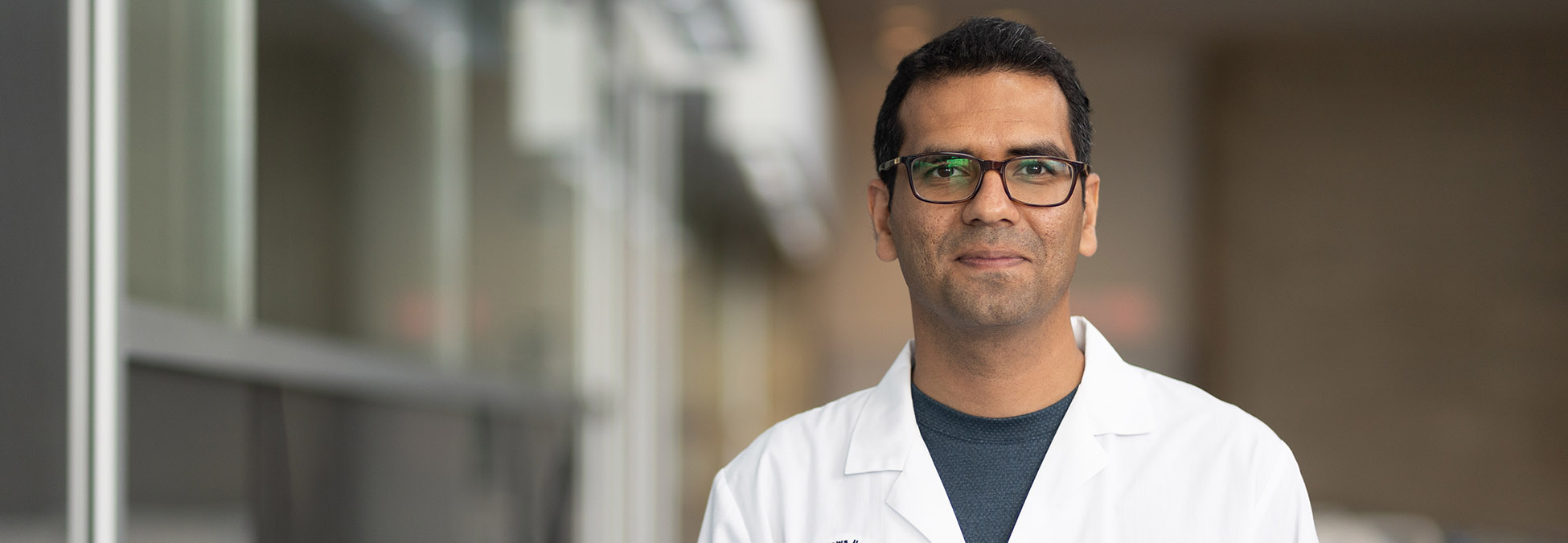
Update: In 2023, Dr. Taha Azad was hired as an Assistant Professor at the Université de Sherbrooke. Congratulations Dr. Azad!
Published: November 2022
Lighting up cancer research with firefly proteins
Meet Dr. Taha Azad, recipient of the 2022 Worton Researcher in Training Award
Using fireflies to study cancer might sound like science fiction, but for Dr. Taha Azad, it’s been his reality for years now. After studying — and teaching — biology in his home country of Iran, Dr. Azad came to Canada, and eventually The Ottawa Hospital, to apply his unique biology know-how to cancer and COVID-19 research. His recent work into how this could lead to better cancer-killing viruses, and his commitment to mentoring his peers, are just a couple of the reasons Dr. Azad is the 2022 Worton Researcher in Training Award winner.
Read on to learn how Dr. Azad balances it all, and why he decided to study cancer.
Update: In 2023, Dr. Taha Azad was hired as an Assistant Professor at the Université de Sherbrooke. Congratulations Dr. Azad!
Published: November 2022
Lighting up cancer research with firefly proteins
Meet Dr. Taha Azad, recipient of the 2022 Worton Researcher in Training Award
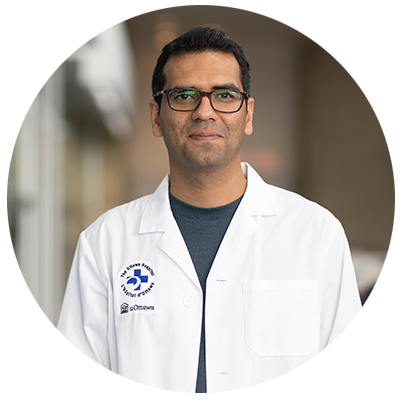
Using fireflies to study cancer might sound like science fiction, but for Dr. Taha Azad, it’s been his reality for years now. After studying — and teaching — biology in his home country of Iran, Dr. Azad came to Canada, and eventually The Ottawa Hospital, to apply his unique biology know-how to cancer and COVID-19 research. His recent work into how this could lead to better cancer-killing viruses, and his commitment to mentoring his peers, are just a couple of the reasons Dr. Azad is the 2022 Worton Researcher in Training Award winner.
Read on to learn how Dr. Azad balances it all, and why he decided to study cancer.
Q: What were your early years like?
A: I grew up in the capital of Iran, Tehran, and I was always really interested in science and fascinated by nature. Tehran is very close to a mountain, and every weekend, my father, my younger sister, and I would go and look around in nature. I always had a lot of questions for my father. He was an engineer, and he didn’t have that much background in science, but I remember he always tried his best to answer my questions.
As time went by and I grew up, I saw family members diagnosed with cancer, and I saw there was no cure for them. I think it happens to many of us; we have a family member who has died because of cancer.
Q: Can you describe your path from biology teacher in Iran to cancer researcher in Canada?
A: I became interested in biology and science and did my undergrad in biology at Tehran University, which is one of the best universities in my country.
After, I became a biology teacher. From 2008 to 2014, I used to go to a different city in my country every week to teach high school students. By the end, I had more than 4,000 hours of teaching experience, and this is what I was really passionate about. During my high school years, unfortunately I didn’t have access to good teachers for biology. It’s a problem in Iran, because the population grew so fast, we didn’t have enough teachers. My country is big, with many different cultures and backgrounds; you see Arab people, Persian people, Turkish people — it was a great opportunity to learn from each of them a little bit.
I liked teaching, but more than that, I liked doing research. I moved to Canada 2014, because I was so interested in research about cancer. I started Googling, and I found Queen’s University, where I did my PhD, before coming to The Ottawa Hospital to join Dr. John Bell’s lab.
Q: Can you describe your research a little?
A: In university, I studied luciferase, a protein in fireflies that emits light. I learned you can get this protein, cut it into two inactive fragments, and then there’s no light anymore. In biology — whether it’s cancer or an infectious disease — you have some proteins that are interacting with each other. We can fuse the two inactive fragments of the luciferase with some of these other proteins, and when they interact while they’re fused to the luciferase, it brings the two inactive fragments of that protein together. When you see light, it means those proteins are interacting, and that’s how we use luciferase to study cancer, or more recently during the pandemic, we used it to study COVID-19.
Q: Why did you choose to work at The Ottawa Hospital?
A: It’s one of the best work environments I’ve ever seen. You see patients, you see great research, you see clinicians — and you see they are working together. In other places, it’s very difficult, because the research might be totally separated from the clinicians, who are in different buildings. Here, they’re all in one place.
For example, in our lab, we get patient samples from time to time when a surgeon asks if the patient would like to volunteer for a study. We get the opportunity to work on these samples and study them to see how we can translate what we’re doing in the lab to patients to increase the quality of their life.
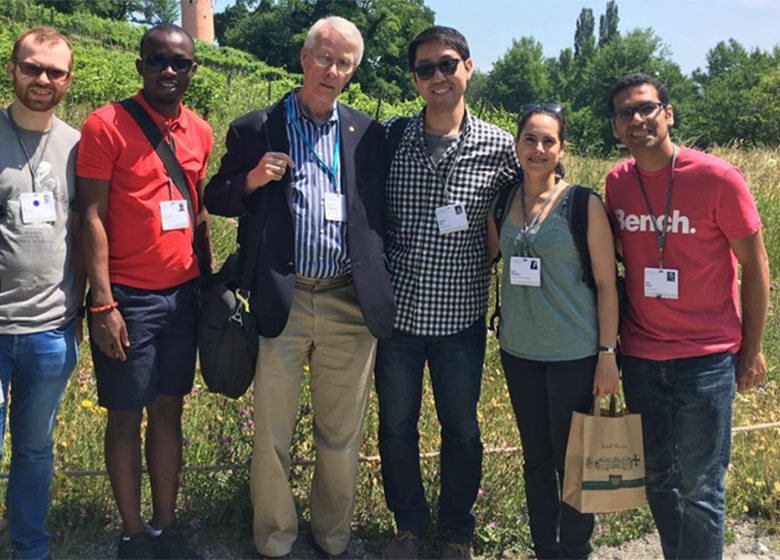
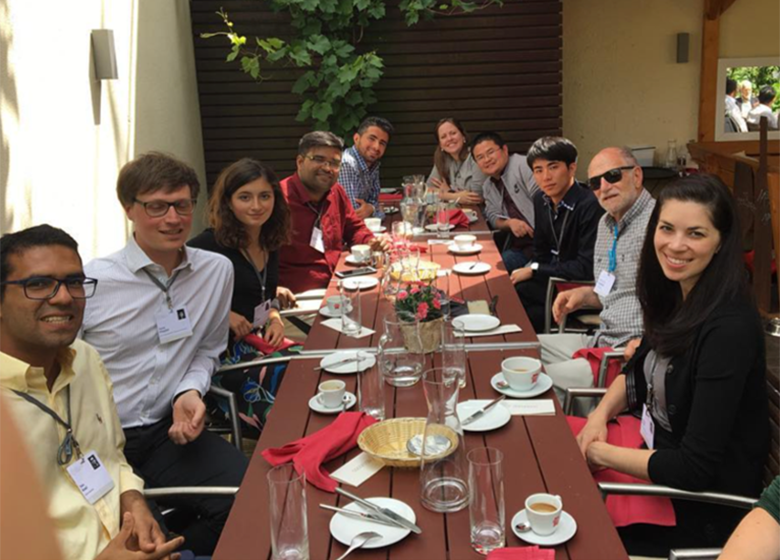
Q: You have a lot on your plate, how do you balance it all?
A: I think balance is very important. You need to pay attention to your mental health, to your body, and to your career as well. Being efficient is very important for this, so it’s really helped me to have every day planned. From waking up, knowing what I should do with my son, then going to the hospital, having my first meeting where we plan for the day. We meet again at the end of the day, discuss what the challenges were, and what we can address the next day. When I get home, I do a little work out, then I get my son from day care and spend time with my family.
Q: Where would we find you when you’re not in the lab?
A: My wife and I like traveling so much. Before the pandemic, we used to go to different countries. Now, we have two babies, one is a newborn, so it’s more difficult for us to go traveling. Still, we like hiking, and every weekend we go to different trails around Ottawa. I also play games with my son, because he’s full of energy that he needs to get rid of. I didn’t think I’d like it so much, but I really like playing with my kids.
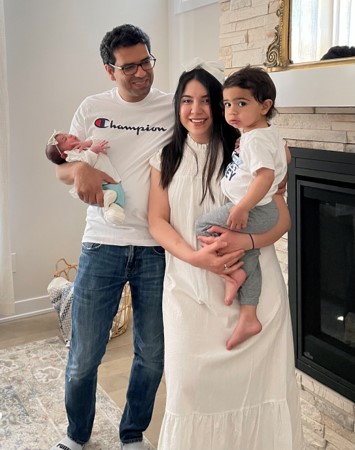
Q: You have a lot on your plate, how do you balance it all?
A: I think balance is very important. You need to pay attention to your mental health, to your body, and to your career as well. Being efficient is very important for this, so it’s really helped me to have every day planned. From waking up, knowing what I should do with my son, then going to the hospital, having my first meeting where we plan for the day. We meet again at the end of the day, discuss what the challenges were, and what we can address the next day. When I get home, I do a little work out, then I get my son from day care and spend time with my family.
Q: You have a lot on your plate, how do you balance it all?
A: I think balance is very important. You need to pay attention to your mental health, to your body, and to your career as well. Being efficient is very important for this, so it’s really helped me to have every day planned. From waking up, knowing what I should do with my son, then going to the hospital, having my first meeting where we plan for the day. We meet again at the end of the day, discuss what the challenges were, and what we can address the next day. When I get home, I do a little work out, then I get my son from day care and spend time with my family.
Q: Where would we find you when you’re not in the lab?
A: My wife and I like traveling so much. Before the pandemic, we used to go to different countries. Now, we have two babies, one is a newborn, so it’s more difficult for us to go traveling. Still, we like hiking, and every weekend we go to different trails around Ottawa. I also play games with my son, because he’s full of energy that he needs to get rid of. I didn’t think I’d like it so much, but I really like playing with my kids.

Q: Where would we find you when you’re not in the lab?
A: My wife and I like traveling so much. Before the pandemic, we used to go to different countries. Now, we have two babies, one is a newborn, so it’s more difficult for us to go traveling. Still, we like hiking, and every weekend we go to different trails around Ottawa. I also play games with my son, because he’s full of energy that he needs to get rid of. I didn’t think I’d like it so much, but I really like playing with my kids.


